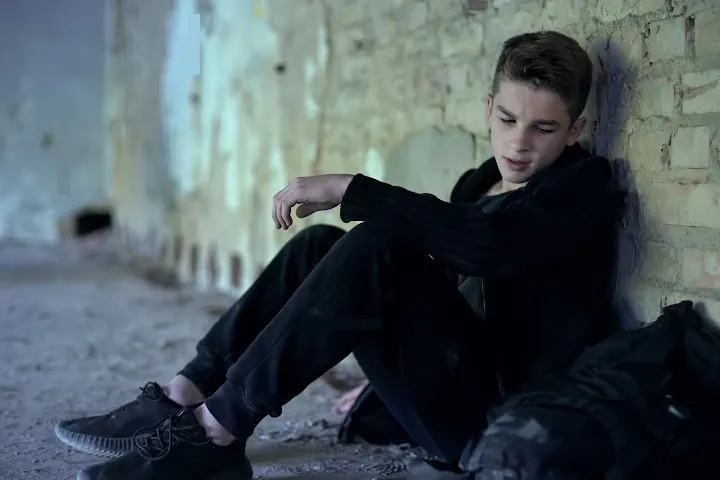TABLE OF CONTENTS
What is a runaway
A runaway teenager is a youth who leaves home without permission and stays away overnight, according to the Office of Juvenile Justice and Delinquency Prevention (OJJDP).
However, some of these runaways are throwaways who are told to leave home or prevented from returning home by their parents.

Why do kids run away
There are a lot of myths on the internet about why teenagers run away from home.
Most of them paint a picture of rebellious teenagers who don’t want to follow the house rules or want to go on an adventure.
These suggestions cannot be further away from the truth.
In 1986, OJJDP cosponsored a study in Toronto, Canada, where running away was not considered a status offense, to understand the cause of teenagers running away from home.
Among 149 adolescents who entered a shelter for runaways, a staggering 73% reported being physically beaten, and 43% reported being physically abused by people they lived with as an essential reason for leaving their homes.
In addition, 40% reported having been attacked or raped1.
For most runaway teens, the reason for running away is that they don’t believe home can protect them from the problems they’re trying to escape.
Running away was the only solution they could think of.
However, not every runaway teen is mistreated at home.
Some runaway teenagers have loving families, but they could be dealing with mental health problems, drug use, family conflicts, shameful mistakes they don’t want to face, or other unknown causes.
But for whatever reason, they didn’t trust that seeking help from home was a good idea, which was the real reason for running away.
A teenage runaway is a call for help2.
It is most likely not a power struggle or manipulative behavior.
They need a home they feel safe to return to and to get help from.
Also See: Why Does A Teenager Lie and How To Deal With It

What to do when your runaway teenager comes home
1. Show your unconditional love
When your teen comes home, the first and best thing to do is to give them a big hug, tell them you love them, and promise you will work through this with them.
Support and help your child get through this difficult time.
Make a conscious effort to show them your unconditional love.
2. Talk to them without blaming, scolding, or guilting them
Talk with your child if they are open to talking.
If they are not, give them some space, but plan to sit down and talk with them soon when they are ready.
When talking, don’t go straight to, “Why did you do this?”
They may not even know the answer themselves.
First, ask questions to ensure safety.
- Are they being hurt or threatened?
- Is drug, alcohol, or crime involved?
- Is someone else in danger?
- Is there anyone or anything that causes them to not want to stay home, and how can you help remove it?
If safety is in question, contact the police immediately.
You may then try to have a heart-to-heart talk with your child to see if you can find out the real reason why they ran away.
But chances are, it will be hard to get that now.
That brings you to step 3.

3. Arrange therapy for your child, you, and the family.
Something made your teen believe they couldn’t come to you for help and instead ran away.
An experienced therapist can help you get to the bottom of the issue.
Seeking therapy doesn’t mean your child has a mental illness or you are a bad parent.
Running away is a traumatic experience for you, your teenager, and the entire family.
Everyone could use some extra emotional support.
It’s a good idea to have separate therapy or counseling for the child and the parent because each family member may have different perspectives and needs.
If there are siblings, they may need additional support, too.
It’s not about who’s right and who’s wrong. It’s about getting to the root cause of the problem, reconnecting, and rebuilding trust in your relationship with your teen.
4. Work on reconnecting.
When your child is facing danger or a difficult situation, they must be able to turn to you for help.
That’s what parents are for.
We protect and help our kids.
There was a disconnect between you and your teen somewhere down the road.
Finally, it goes without saying that punishing your teen is not a good idea.
Punishment doesn’t make anyone feel safe.
Who wants to return to a family that punishes you instead of helping you?
But if they didn’t do that, chances are they didn’t trust you could help.
Is it due to poor communication?
Is it the fear of punishment?
Could your behavior constitute a threat to your teenager?
Yelling or punishment, for instance, can lead to an unsafe environment and damaged relationships, not to mention the broken trust between you and your child.
Consider stepping back and looking deep inside yourself.

Final thoughts on how to deal with a runaway teenager
Runaway kids are at high risk of teen pregnancy4, delinquency5, sexual exploitation6, and suicide7.
Create a safe environment for your child to prevent them from running away.
Irrespective of why your child ran away, getting psychotherapy for your child and yourself is the best way to get to the bottom of this.
Check out this article on how to parent teens.

References
- 1.Janus MD, McCormack A, Burgess AW, Hartman C. Adolescent Runaways: Causes and Consequences. Lexington Books/DC Heath and Com; 1987.
- 2.Kurtz PD, Kurtz GL, Jarvis SV. Problems of maltreated runaway youth. Adolescence. 1991;26(103):543–555. https://psycnet.apa.org/record/1992-09393-001
- 3.Kellogg ND, Menard SW. Violence among family members of children and adolescents evaluated for sexual abuse. Child Abuse & Neglect. Published online December 2003:1367-1376. doi:10.1016/j.chiabu.2003.10.008
- 4.Thompson SJ, Bender KA, Lewis CM, Watkins R. Runaway and Pregnant: Risk Factors Associated with Pregnancy in a National Sample of Runaway/Homeless Female Adolescents. Journal of Adolescent Health. Published online August 2008:125-132. doi:10.1016/j.jadohealth.2007.12.015
- 5.Kim MJ, Tajima EA, Herrenkohl TI, Huang B. Early Child Maltreatment, Runaway Youths, and Risk of Delinquency and Victimization in Adolescence: A Mediational Model. Social Work Research. Published online March 1, 2009:19-28. doi:10.1093/swr/33.1.19
- 6.Saewyc EM, Edinburgh LD. Restoring Healthy Developmental Trajectories for Sexually Exploited Young Runaway Girls: Fostering Protective Factors and Reducing Risk Behaviors. Journal of Adolescent Health. Published online February 2010:180-188. doi:10.1016/j.jadohealth.2009.06.010
- 7.Greene JM, Ringwalt CL. Youth and Familial Substance Use’s Association with Suicide Attempts among Runaway and Homeless Youth. Substance Use & Misuse. Published online January 1996:1041-1058. doi:10.3109/10826089609072286
